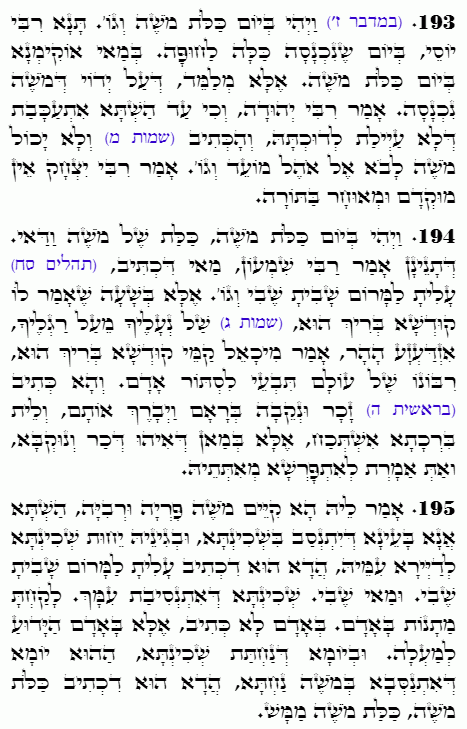Daily Zohar # 4588 – Naso – Moses’s bride
Daily Zohar 4588

Hebrew translation:
194. וַיְהִי בְּיוֹם כַּלּוֹת מֹשֶׁה, וַדַּאי כַּלָּתוֹ שֶׁל מֹשֶׁה. שֶׁשָּׁנִינוּ, אָמַר רַבִּי שִׁמְעוֹן, מַהוּ שֶׁכָּתוּב (תהלים סח) עָלִיתָ לַמָּרוֹם שָׁבִיתָ שֶּׁבִי וְגוֹ’? אֶלָּא בְּשָׁעָה שֶׁאָמַר לוֹ הַקָּדוֹשׁ בָּרוּךְ הוּא (שמות ג) שַׁל נְעָלֶיךָ מֵעַל רַגְלֶיךָ, הִזְדַּעֲזַע הָהָר. אָמַר מִיכָאֵל לִפְנֵי הַקָּדוֹשׁ בָּרוּךְ הוּא: רִבּוֹנוֹ שֶׁל עוֹלָם, הֲתִרְצֶה לִסְתֹּר אָדָם? וַהֲרֵי כָּתוּב (בראשית ה) זָכָר וּנְקֵבָה בְּרָאָם וַיְבָרֶךְ אֹתָם, וְאֵין נִמְצֵאת הַבְּרָכָה אֶלָּא בְּמִי שֶׁהוּא זָכָר וּנְקֵבָה, וְאַתָּה אוֹמֵר לְהִפָּרֵד מֵאִשְׁתּוֹ?
195. אָמַר לוֹ: הֲרֵי קִיֵּם מֹשֶׁה פְּרִיָּה וּרְבִיָּה, כָּעֵת אֲנִי רוֹצֶה שֶׁיִּשָּׂא אֶת הַשְּׁכִינָה, וּבִשְׁבִילוֹ תֵרֵד הַשְּׁכִינָה לָדוּר עִמּוֹ. זֶהוּ שֶׁכָּתוּב עָלִיתָ לַמָּרוֹם שָׁבִיתָ שֶּׁבִי. וּמַהוּ הַשֶּׁבִי? שְׁכִינָה שֶׁנִּשְׂאָה לְךָ. לָקַחְתָּ מַתָּנוֹת בָּאָדָם. בְּאָדָם לֹא כָתוּב, אֶלָּא בָּאָדָם הַיָּדוּעַ לְמַעְלָה. וּבַיּוֹם שֶׁיָּרְדָה הַשְּׁכִינָה, אוֹתוֹ יוֹם שֶׁנִּשְׂאָה לְמֹשֶׁה הִיא יָרְדָה, זֶהוּ שֶׁכָּתוּב כַּלּוֹת מֹשֶׁה, כַּלַּת מֹשֶׁה מַמָּשׁ.
.
Zohar Naso
Continued from previous DZ
#193
Numbers 7:1
“וַיְהִי בְּיוֹם כַּלּוֹת מֹשֶׁה לְהָקִים אֶת הַמִּשְׁכָּן וַיִּמְשַׁח אֹתוֹ וַיְקַדֵּשׁ אֹתוֹ וְאֶת כָּל כֵּלָיו וְאֶת הַמִּזְבֵּחַ וְאֶת כָּל כֵּלָיו וַיִּמְשָׁחֵם וַיְקַדֵּשׁ אֹתָם.”
“Now it came to pass, when Moses had finished setting up the tabernacle, that he anointed it and consecrated it and all its furnishings, and the altar and all its utensils; so he anointed them and consecrated them.”
Rabbi Yossi explained that this refers to the day the bride entered the chuppah (Wedding Canopy), which is the Shechina. He asks, if so, why does it say “on the day that Moses finished (כַּלּוֹת)”? It would have sufficed to say “on the day that the bride entered.” He answers that it teaches us that it was through Moses that the Shechina entered the Tabernacle.
Rabbi Yehuda asked, “Until now, had the Shechina not entered its place? For it is written,
Exodus 40:35
“וְלֹא יָכֹל מֹשֶׁה לָבוֹא אֶל אֹהֶל מוֹעֵד כִּי שָׁכַן עָלָיו הֶעָנָן וּכְבוֹד יְהוָה מָלֵא אֶת הַמִּשְׁכָּן.”
“And Moses was not able to enter the tabernacle of meeting because the cloud rested above it, and the glory of the LORD filled the tabernacle.”
This verse indicates that the Shechina was already in the tent of meeting before this day.” Rabbi Yitzchak replied, “אֵין מֻקְדָּם וּמְאֻחָר בַּתּוֹרָה” “There is no chronological order in the Torah.” The verse “And Moses was not able to enter” is later than the verse here.
Notes;
This teaching emphasizes Moses’s significant role in facilitating the dwelling of the Shechina among the Israelites and the importance of understanding the non-linear nature of the Torah’s narrative to fully grasp the spiritual significance of these events.
#194
The Shechina is called the bride of Moses, as she is indeed his bride. We have learned from Rabbi Shimon that this verse relates to Moses;
Psalm 68:19
“עָלִיתָ לַמָּרוֹם שָׁבִיתָ שֶּׁבִי לָקַחְתָּ מַתָּנוֹת בָּאָדָם וְאַף סוֹרְרִים לִשְׁכֹּן יָהּ אֱלֹהִים.”
“You have ascended on high, You have led captivity captive; You have received gifts among men, Even from the rebellious, That the LORD God might dwell there.”
When the Holy One, Blessed be He, said to Moses, “שַׁל נְעָלֶיךָ מֵעַל רַגְלֶיךָ” “Take off your shoes from your feet” (Exodus 3:5), the mountain trembled. The angel Michael said before the Holy One, Blessed be He, “Master of the Universe, do you wish to nullify the creation of humans? For it is written,
Genesis 5:2
“זָכָר וּנְקֵבָה בְּרָאָם וַיְבָרֶךְ אֹתָם וַיִּקְרָא אֶת שְׁמָם אָדָם בְּיוֹם הִבָּרְאָם.”
“He created them male and female, and blessed them and called them Mankind in the day they were created.”
And no blessing is found except in one who is completed male and female. Yet, you have told Moses to separate from his wife, as ‘Take off your shoes from your feet’ implies separation from his wife, as the verse speaks in a modest language.”
Notes:
There is a delicate balance between Moses’ extraordinary spiritual role (Da’at) and the universal principles of blessing and male and female union. The Torah also emphasizes the importance of understanding the symbolic language used to uncover the deeper spiritual meanings within its words.
#195
The Holy One, Blessed be He, said to him (the angel Michael), “Moses has already fulfilled the commandment of being fruitful and multiplying. Now I want him to take the Shechina as his bride, and for his sake, the Shechina will descend to dwell with him.” As it is said, “You have ascended on high, you have led captivity captive” (Psalms 68:19). What is “שֶּׁבִי” “captive”? It is the Shechina that was taken with you. “You have received gifts among men” (באדם), with the vowelization of “ba’adam” indicating the known man above, which is Zeir Anpin (Z “A). The gift is the Shechina that Z” A gave to him. On the day the Shechina descended, she was taken as Moses’ bride, as it is written, “the bride of Moses,” indeed the bride of Moses.
Lesson;
When Moses ascended to receive the Torah, he received gifts from the angels. The Torah itself embodies the aspect of the Shechina because the Light of Hashem is revealed through the Torah in this world, making it an expression of the Shechina .
For this purpose, Moses embodies the aspect and level of the Sefirah of Da’at, which represents the unification of Father and Mother, Chokmah and Binah, Male and Female, Light and Vessel.
We need to establish a spiritual connection to the Shechina (Female aspect) through the Torah (Male aspect) to draw blessings from above.
{||}

 Previous: Naso
Previous: Naso

